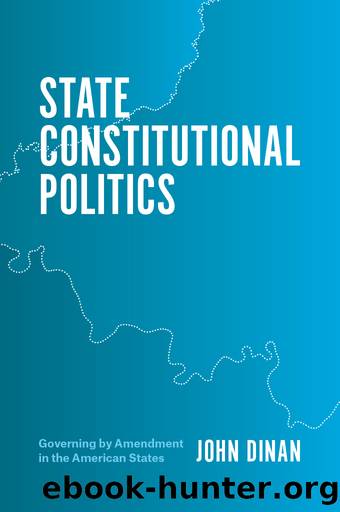State Constitutional Politics: Governing by Amendment in the American States by John Dinan

Author:John Dinan [Dinan, John]
Language: eng
Format: epub
Tags: Government, State; Provincial & Municipal, Political Science, Political Process, American Government, State, Law, General
ISBN: 9780226532950
Google: tudRDwAAQBAJ
Goodreads: 35960718
Publisher: University of Chicago Press
Published: 2018-04-06T00:00:00+00:00
Participation in Federal Grant Programs
Another wave of amendments was prompted by passage of the Social Security Act of 1935 and was intended to overcome state constitutional provisions limiting state participation in federal grant-in-aid programs. The Social Security Act, known primarily for its purely federal Old Age and Survivors Insurance (OASI) program, was a wide-ranging act that also launched an Unemployment Insurance program and provided grants-in-aid to states for Aid to Dependent Children (ADC), Aid to the Blind (AB), and Old-Age Assistance (OAA) programs. The challenge for some states seeking to benefit from these ADC, AB, and OAA public-assistance programs was that rules for participating states were at odds with long-standing state constitutional provisions.139 Among other rules, states were required to adopt statewide programs rather than making participation optional for localities, as was the norm in many states up to that point. States seeking federal support for old-age assistance programs had to set an age of eligibility of sixty-five; several state old-age pension programs had previously set a higher eligibility age. There was also the long-standing challenge, already overcome by some but not all states, posed by state constitutional provisions preventing payment of public funds to individuals.
In the immediate aftermath of the Social Security Actâs passage, voters in several states approved amendments with an eye to overcoming state constitutional provisions inhibiting state participation in these grant programs. For instance, a 1936 Florida amendment allowed counties to continue providing assistance to residents âwho by reason of age, infirmity, or misfortune, may have claims upon the aid and sympathy of society,â but also provided, in keeping with the requirements of the Social Security Act for maintenance of a statewide system, that âthe Legislature may by general law provide for a uniform State-wide system for such benefits, and appropriate money therefor.â140 Meanwhile, Missouri voters, who had previously approved a 1932 amendment authorizing old-age assistance for persons over seventy years of age, approved a 1938 amendment lowering the age to sixty-five, to comply with federal requirements.141
Most of the amendments approved in the immediate aftermath of the Social Security Actâs passage focused on authorizing payment of public funds to individuals, thereby overcoming long-standing state constitutional limits on such payments. For instance, Pennsylvania voters, who had already approved a 1933 amendment authorizing payment of public funds to blind persons and war veterans,142 approved another amendment in 1937 authorizing old-age assistance and mothersâ pensions.143 Voters in other states adopted similar amendments authorizing payments to the elderly, the blind, and mothers of dependent children, and occasionally unemployed persons, thereby enabling states to receive federal grants and make payments to these persons. In addition to the already noted amendments, voters approved amendments of this sort in Kentucky and Texas in 1935;144 in Kansas, Louisiana, Oklahoma, and South Carolina in 1936;145 and in Texas146 in 1937.147
Nearly all of the social welfare policy amendments enacted in the 1930s and 1940s were policy-authorizing amendments; but it is worth noting that some amendments during this time took the form of policy-enacting amendments unprompted by concerns about legitimacy of state policies.
Download
This site does not store any files on its server. We only index and link to content provided by other sites. Please contact the content providers to delete copyright contents if any and email us, we'll remove relevant links or contents immediately.
| Antitrust | Civil Law |
| Emigration & Immigration | Federal Jurisdiction |
| Housing & Urban Development | Indigenous Peoples |
| Land Use | Public |
| Public Contract | Public Utilities |
| Urban, State & Local Government |
Machine Learning at Scale with H2O by Gregory Keys | David Whiting(4292)
Killers of the Flower Moon by David Grann(4037)
Oathbringer (The Stormlight Archive, Book 3) by Brandon Sanderson(3149)
Will by Will Smith(2906)
Once Upon a Broken Heart by Stephanie Garber(2843)
Guns, Germs and Steel by Diamond Jared(2365)
It Starts With Us (It Ends with Us #2) by Colleen Hoover(2338)
Borders by unknow(2301)
Friends, Lovers, and the Big Terrible Thing by Matthew Perry(2219)
The Room Where It Happened by John Bolton;(2150)
The Color of Law by Richard Rothstein(1935)
A Short History of War by Jeremy Black(1842)
The Strength In Our Scars by Bianca Sparacino(1840)
HBR's 10 Must Reads 2022 by Harvard Business Review(1838)
A Game of Thrones (The Illustrated Edition) by George R. R. Martin(1711)
Water Rights and the Environment in the United States by John Burch(1673)
515945210 by Unknown(1660)
Examples & Explanations: Administrative Law by William F. Funk & Richard H. Seamon(1639)
That Every Man Be Armed by Stephen P. Halbrook(1576)
